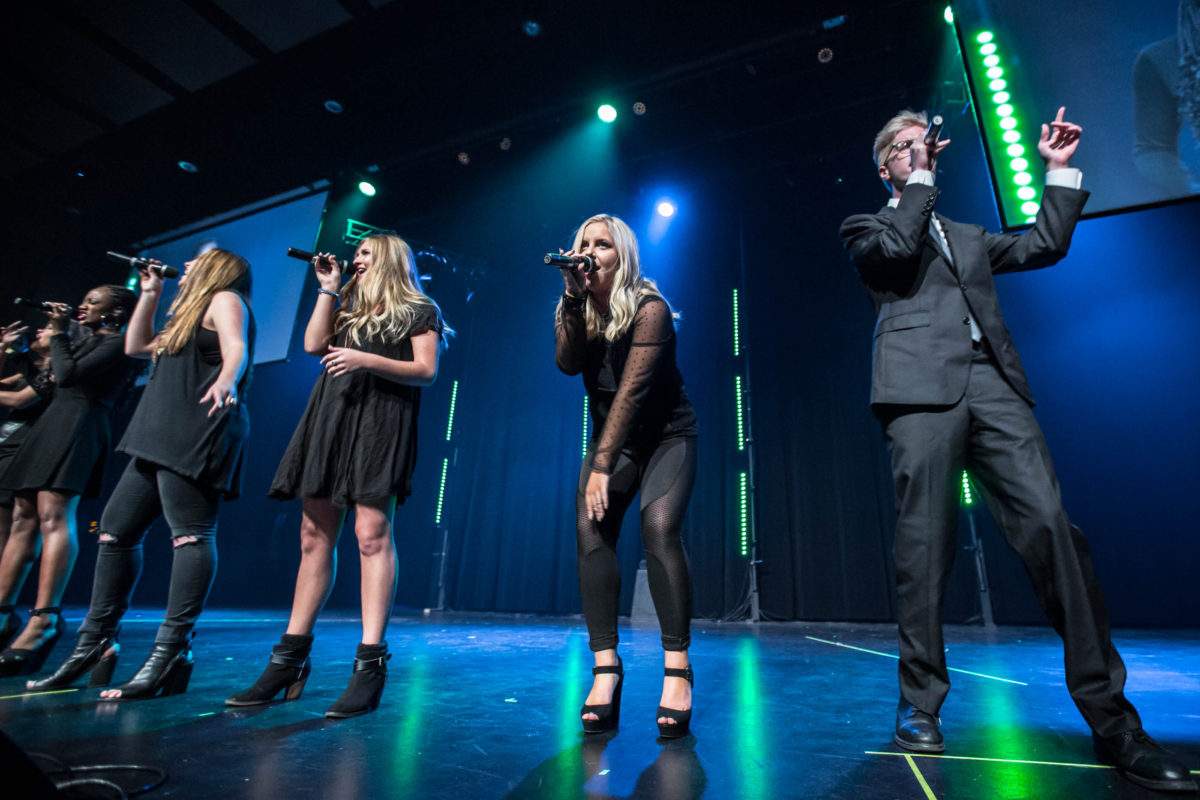Last week, my a cappella group OneVoice spent four days in the studio with a cappella legend Dave Sperandio. Even though this was our sixth album with him, we’re still learning valuable lessons from the process. Preparing for our performance with The Swingles at The London A Cappella Festival next week, I was anxious about the prospect of losing these four days of rehearsal to recording. I should have known better by now. Not only did my singers work through a plethora of small musical issues, they also gained a tremendous amount of confidence. Today’s rehearsal was the best one we’ve had all year.
If you want to set up your a cappella group for success at their next competition or big performance, you’ll do almost anything. You might work with guest clinicians, perform in less pressure-filled situations, get feedback from peers, and/or video and watch your set.
The one thing you’re probably not doing that you should? Recording.
That’s right, recording– the thing that is different in so many ways from the actual live performance. There’s no audience. There’s no staging, choreography, or visuals of any kind. Singers record one or two at a time to a MIDI and click track. The stage is replaced by a recording booth. You get the idea– it’s VERY different (if the idea of recording one person at a time with a MIDI and click track seems strange to you, read my article on best practices for recording a cappella groups).
However, putting your group through process of recording your performance or competition set will elevate your live singing in ways you may have never considered:
- Accuracy of Pitch and Rhythm. Those who have recorded know that regardless of how much you think you’ve prepared, your singers will still miss notes and rhythms. Sure, they may still fit in the chord and not get in the way, but they’re not correct. You’ll also find spots where your singers aren’t as confident about the notes and rhythms. When you’re in the studio and singing your part in isolation, there’s no hiding.
- Syllable and Vowel Discrepancies. “Is it ‘ah’, ‘oh’, or ‘uh’ there at m. 27?” This is by far the most common thing I’ve noticed happening during recording sessions. I think I have a pretty good ear in rehearsals, but I still miss a ton of these. Uniform vowels tune much better than different vowels, so this matters more than you may think.
- Placement Issues. When you hear each singer by themselves on a part, you will discover odd issues about their parts and their ranges. Sometimes, a part is too high and a singer has to use a breathy head voice that lacks the power a song demands. Just as often, you will find that a singer can hide when doubled on a part with a stronger singer. Placement issues not only affect the overall tone of the group, but the confidence of each individual.
- Breath Support Problems. We know that almost all singers struggle with breath support, but to what extent and why? Recording can isolate the “where’s” and “why’s” behind these issues. By making singers focus on individual phrases and provide ample power behind each one, you will help build habits that will produce improved live singing.
Marginally improving each of these areas leads to massive musical gains in the aggregate. Not only will your singers be performing with better vowels, support, tone, pitch, and rhythm, they will also be more confident.
I have heard hundreds of directors tell groups to “be more confident” as if it’s a choice they are choosing not to make. Unfortunately, confidence is not something that can simply be willed– it must be created through competence. Competence leads to confidence. Where does competence come from? It comes from knowing the rhythms and notes 100%, having the support needed to sing each phrase, aligning syllables and vowels perfectly with other singers, and understanding healthy placement for each phrase you execute. In essence, competence leads to confidence because it removes the barriers to open, honest expression. Without fear, singers are free to perform to their fullest extent.
Recording is the ultimate filter for these barriers, removing them one by one with laser-like efficiency. Don’t believe me? Try it for yourself. You’ll discover that the things holding your group back from its true potential may not be one giant wound, but a thousand paper cuts.

